What Comes Before
BARROW, ALASKA– Have you ever seen a report of some amazing new scientific discovery on TV, or read about it in the newspaper or on the Internet? When you did, did you wonder how the researchers were able to make that discovery? What did they have to go through in order to learn that new information?
Usually, they don’t tell you. You don’t get to see all the things that happen before the big discovery, the little baby steps that bring you to the point where the discovery actually can happen.
I think this is too bad. There’s a lot work and a lot of support that goes on behind the scenes, much of it done by people who are not actually scientists. So I thought I’d start out, before the crew shows up here in Barrow and we get out in the field, with a little behind-the-scenes look at some of the stuff that we’ve been doing to get ready for the summer field season, and some of the people who have been helping.
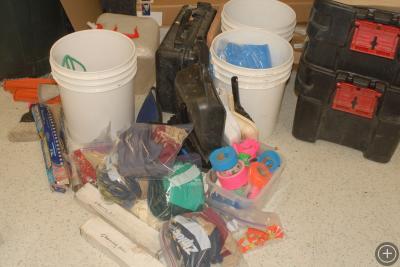
Some of our gear. Pictured here: 5-gallon buckets, dustpans, gloves, flagging tape, stakes, chaining pins in boxes, foil, water container, pelican case, and Action Packers to hold all of it.
Buying supplies
There are a lot of supplies an archaeologist needs in the field. Since most of these things can’t be bought in Barrow, and shipping can take a while, we started ordering them months ago. All of our field notes have to be taken on “Rite-in-the-Rain ™” paper, so they don’t get smudged or melt. We order reams of blank paper, and then laser printer our field forms onto them. Sharpies and mechanical pencils get used by the box, so we order ample supplies of those as well.
This year we bought a couple of new planning frames, which are squares that go over an excavation unit someone is mapping. They help people draw quickly and accurately. We also got several new north arrows for photography (for some reason they seem to grow legs and walk off) and a very nice new set of photo scales made by a company in France.
We also use a lot of Ziploc bags, in different sizes. We use freezer bags, both because they’re a bit more durable, and because they seem to work better in the cold temperatures we have up here. They can be bought locally, but in the quantities that we use, the store can easily be bought out. Therefore, we start buying them early in smaller batches. We’ve already got a huge stack in the lab.
Getting a crew
For the last several weeks, I have been reviewing resumes from graduate and undergraduate students who are interested in participating in the project. After posting project information on a couple of sites listing excavation opportunities, we got way more applicants than we could place. The result: a pretty rigorous winnowing-out process.
Since it’s a long (and expensive) trip up here and the field conditions are fairly harsh, it was really important to interview not only the applicants, but also their references, especially those who have been in the field with them. The decisions were finally made, and I had to do the tough job of notifying those who didn’t make it. I hope we’ve got a good crew. We’ll find out soon– the folks from out of town will start arriving on May 24.
We are now starting to get applications from local high school students will also be taking part in the project. We’ll be doing those interviews in the next couple of weeks, sandwiched around a trip to Yellowknife, Canada, to give a presentation at a meeting there.
The work before the fieldwork
At least two of the students from last year are back. One has already been working for a week in the lab. He has been cleaning and sharpening trowels, cleaning and restocking the boxes full of field equipment and supplies, and labeling the newly arrived equipment. He will be setting up some new shelving we just got and moving all the batteries and chargers onto that. It is time to start charging all of the radios, transit batteries, camera batteries, and computer batteries (not to mention the batteries for all the Ice Stories gear) that we take into the field with us every day.


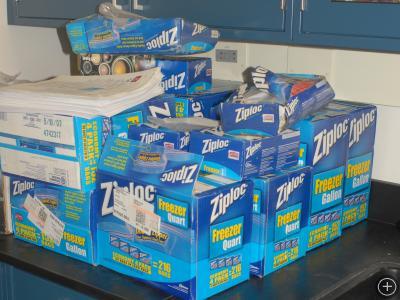
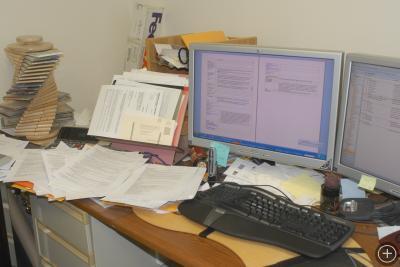
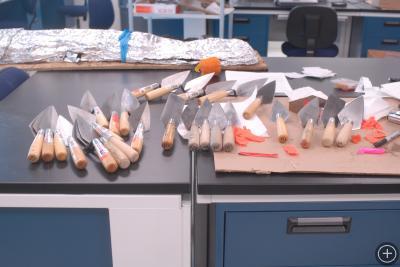
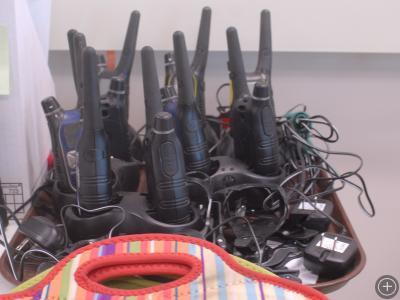

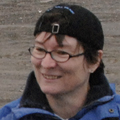

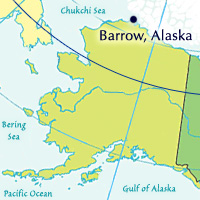





Hi Anne!
This is Dora from North Carolina –
I am really looking forward to following your summer work at Nuvuk. I understand that a PolarTrec teacher will be joining you sometime in June or July — what a wonderful opportunity. I will be keeping up with the PolarTrec logs as well.
Best of luck to you for this field season — wish I could be there. But — at least I will be able to experience the adventure via Ice Stories and PolarTrec.
Dora Nelson
Asheville, North Carolina
Hi Dora!
Wish you could make it too! Great to hear from you. Hope all is well in NC.
We are getting a PolarTrec teacher in July, so there should be lots to see/read about the project this summer.
Anne J
Barrow